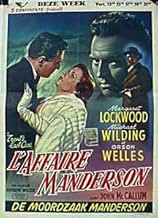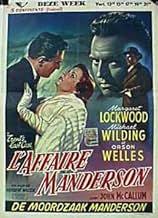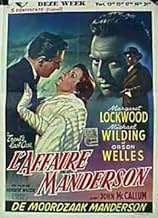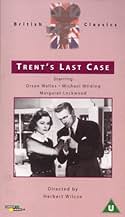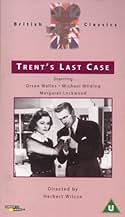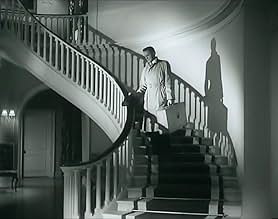IMDb-BEWERTUNG
6,0/10
642
IHRE BEWERTUNG
Füge eine Handlung in deiner Sprache hinzuA reporter investigates a rich businessman's death. While police rule it suicide, Trent believes it's murder and grows intrigued by the widow and secretary.A reporter investigates a rich businessman's death. While police rule it suicide, Trent believes it's murder and grows intrigued by the widow and secretary.A reporter investigates a rich businessman's death. While police rule it suicide, Trent believes it's murder and grows intrigued by the widow and secretary.
- Regie
- Drehbuch
- Hauptbesetzung
Geoffrey Bayldon
- Reporter in Court
- (Nicht genannt)
Ernest Blyth
- Concert Attendee
- (Nicht genannt)
Robert Cawdron
- Police Constable
- (Nicht genannt)
John Chandos
- Tim O'Reilly
- (Nicht genannt)
Anthony Collins
- Conductor
- (Nicht genannt)
Henry Edwards
- Coroner
- (Nicht genannt)
Eileen Joyce
- Pianist
- (Nicht genannt)
Ben Williams
- Jimmy - Reporter
- (Nicht genannt)
Kenneth Williams
- Horace Evans
- (Nicht genannt)
Empfohlene Bewertungen
MICHAEL WILDING is an armchair detective who sets out to determine whether or not the death of ORSON WELLES was suicide or murder. He thinks he's solved the case, only to learn that all is not what it appears (without giving the outcome away).
Unfortunately, the script is a dreary, talky and ponderous, making the film appear to be an amateurish stage play, although based on a novel. It's static. Nothing at all cinematic about the approach, nor is there any imagination in the directing.
Of all the players, MARGARET LOCKWOOD as the beautiful wife of the deceased man and JOHN McCALLUM as the man's secretary have key roles that they play with assurance. ORSON WELLES, with fake nose and bushy brows, might as well have been from another film. His ten or fifteen minutes of time on screen renders nothing but ham. Director Herbert Wilcox was evidently unable to tone him down and as a result his key scenes throw the film off stride. MICHAEL WILDING has a colorless role as the newspaper reporter who suspects foul play but can't prove anything.
With a talky script and lack of any cinematic touches, TRENT'S LAST CASE goes nowhere fast and leaves the viewer expecting a strong twist that never arrives--instead, a flat ending.
Production values are fine even though the film comes from the usually low-budget Republic studios.
Unfortunately, the script is a dreary, talky and ponderous, making the film appear to be an amateurish stage play, although based on a novel. It's static. Nothing at all cinematic about the approach, nor is there any imagination in the directing.
Of all the players, MARGARET LOCKWOOD as the beautiful wife of the deceased man and JOHN McCALLUM as the man's secretary have key roles that they play with assurance. ORSON WELLES, with fake nose and bushy brows, might as well have been from another film. His ten or fifteen minutes of time on screen renders nothing but ham. Director Herbert Wilcox was evidently unable to tone him down and as a result his key scenes throw the film off stride. MICHAEL WILDING has a colorless role as the newspaper reporter who suspects foul play but can't prove anything.
With a talky script and lack of any cinematic touches, TRENT'S LAST CASE goes nowhere fast and leaves the viewer expecting a strong twist that never arrives--instead, a flat ending.
Production values are fine even though the film comes from the usually low-budget Republic studios.
Unlike the other reviewers above, I enjoyed this film immensely, probably because I am a Margaret Lockwood fan and collect as many of her films as I can when they are available.This one is not commercially available but I managed to find a dealer on Ebay who specialises in the older films I like.The other reviewers mention it is too "talky" but this is not supposed to be "Die Hard" or even a James Bond adventure.It is a cultured British film, from Republic films, from 1952 with an excellent cast who speak with wonderful diction and enunciation before "kitchen sink drama" mesmerised film producers.Herbert Wilcox (Anna Neagle's husband) produced this gripping thriller that keeps you guessing right up to the very end.I will concede that the plot is at times a bit like an amateur dramatic society but this gives it its intrinsic charm especially when the principal parts are played by good professional actors.An example is Orson Wells sitting in an armchair and filmed from the rear redolent of a James Bond villain.He only needed to be stroking a white cat on his lap!! Michael Wilding plays his usual debonair self as "Philip Trent" the artistic crime reporter.Margaret Lockwood plays again the pianoforte (see my critique of "Love Story" (1944) when she played Lissa Campbell),This time we have the pleasure of listening to Eileen Joyce (the real pianist) playing the famous Mozart piano concerto no:24 in C minor, larghetto movement.Eileen's other famous film credit was playing the Rachmaninov 2nd piano concerto in C minor for "Brief Encounter (1945).Orson as mentioned was fond of Shakespeare's "Othello" and some of this plot is worked into this film.Like "The Third Man" (1949), Orson does not appear until late into the film but he immediately makes his not inconsiderable presence felt as "Sigsbee Manderson".Margaret plays Margaret Manderson his wife.No trouble remembering her name by the cast!John McCallum gives a workmanlike performance as John Marlowe, the secretary to Manderson and Miles Malleson for once leaves aside his clerical garb to play Burton Cupples, Margaret's uncle.What amused me was seeing a very young Kenneth Williams playing a garrulous Welsh gardener! You would only see this film if you you actively set out to acquire it since it never appears on the the TV and as I said is not commercially available.Obviously being a thriller I will not divulge the plot.Suffice to say it ends happily for all concerned.I rated it 8/10. Since I wrote this critique in July 2007 this title is now commercially available from www.silversirens.co.uk Enjoy!
Surprisingly for me, this is a remake of a movie based on a novel written in 1913 or whereabouts. Surprisingly, because the plot is nothing special, a sort of opposite-gender "Leave her to Heaven", but a lot more lackluster.
Michael Wilding is the titular Trent, a bland and moderately charming artist-journalist (?) investigating the bizarre suicide of unpleasant billionaire Sigsbee (???) Manderson. What with the weird name? Anyway, after a coroner's verdict of suicide, Trent is intrigued by allegations of Manderson's wife having an affair with her husband's dashing secretary.
Lockwood plays the wife and she's the only substantial and charming presence in the movie. There is a lot of talk and only by the third act we get to see Orson Welles with bushy eyebrows and prosthetic nose as Sigsbee and he's indeed a malevolent character but also very grotesque, due to the ridiculous disguise.
After long explanations from all the players the movie ends on a happy, albeit forced, note.
Due to Welles appearing so late and to take advantage of the popularity of an earlier film, in Italy this was titled "The Third Man Returns", even if it has nothing to do with that masterpiece.
Michael Wilding is the titular Trent, a bland and moderately charming artist-journalist (?) investigating the bizarre suicide of unpleasant billionaire Sigsbee (???) Manderson. What with the weird name? Anyway, after a coroner's verdict of suicide, Trent is intrigued by allegations of Manderson's wife having an affair with her husband's dashing secretary.
Lockwood plays the wife and she's the only substantial and charming presence in the movie. There is a lot of talk and only by the third act we get to see Orson Welles with bushy eyebrows and prosthetic nose as Sigsbee and he's indeed a malevolent character but also very grotesque, due to the ridiculous disguise.
After long explanations from all the players the movie ends on a happy, albeit forced, note.
Due to Welles appearing so late and to take advantage of the popularity of an earlier film, in Italy this was titled "The Third Man Returns", even if it has nothing to do with that masterpiece.
This viewer is not exactly a devotee of the films of Herbert Wilcox but this one is not at all bad. E. C. Bentley had intended his novel to be a parody and although Wilcox has chosen to play it straight one cannot actually take it too seriously. This director's notable lack of flamboyance happens to suit this rather innocuous, teddibly civilised period piece very well.
It is presented by Republic Pictures for whom Orson Welles had made his bizarre 'Macbeth.' One is intrigued by his third billing and eagerly awaits his appearance. It is certainly worth the wait as his Mephistophelian presence and basso profundo are absolutely magnetic. It seems as if we are suddenly in an entirely different film and one is hardly surprised to learn that Welles wrote and directed his own scenes!
As for the rest of the film we have the debonair Michael Wilding, certainly no stranger to Wilcox, who is well cast as Bentley's engaging amateur sleuth of the title. Playing the widow of the millionaire who is assumed to have committed suicide, although Trent suspects foul play, is Margaret Lockwood. It is far more difficult to play 'good' than 'bad' and Miss Lockwood is more effective when playing the latter. The same comment would also apply to John McCallum as the prime suspect. The delightful Miles Malleson is, well.....Miles Malleson!
There is splendid use made of the Larghetto from Mozart's C minor piano concerto which suits the melancholy mood of the film.
By far the best scene(surprise, surprise) is one directed and wonderfully lit by Welles in which he and John McCallum discuss Shakespeare's depiction of a husband's jealousy in 'Othello'. Welles remarks that he had recently seen this play performed at St. James's Theatre and was none too keen on the leading actor. He is of course referring to, yes, you've guessed it........ himself!
It is presented by Republic Pictures for whom Orson Welles had made his bizarre 'Macbeth.' One is intrigued by his third billing and eagerly awaits his appearance. It is certainly worth the wait as his Mephistophelian presence and basso profundo are absolutely magnetic. It seems as if we are suddenly in an entirely different film and one is hardly surprised to learn that Welles wrote and directed his own scenes!
As for the rest of the film we have the debonair Michael Wilding, certainly no stranger to Wilcox, who is well cast as Bentley's engaging amateur sleuth of the title. Playing the widow of the millionaire who is assumed to have committed suicide, although Trent suspects foul play, is Margaret Lockwood. It is far more difficult to play 'good' than 'bad' and Miss Lockwood is more effective when playing the latter. The same comment would also apply to John McCallum as the prime suspect. The delightful Miles Malleson is, well.....Miles Malleson!
There is splendid use made of the Larghetto from Mozart's C minor piano concerto which suits the melancholy mood of the film.
By far the best scene(surprise, surprise) is one directed and wonderfully lit by Welles in which he and John McCallum discuss Shakespeare's depiction of a husband's jealousy in 'Othello'. Welles remarks that he had recently seen this play performed at St. James's Theatre and was none too keen on the leading actor. He is of course referring to, yes, you've guessed it........ himself!
Agatha Christie considered this intrigue one of the best ever written, and it certainly is. The mystery is deep here, and as it gradually is unravelled you are in for any number of surprises. The actors are outstanding, with Michael Wilding as the detective intruding on the private lives of the young widow Margaret Lockwood and the man who loves her, who is the prime suspect, while Orson Welles as the victim provides an impressing finale as he enters in the final flashback. Miles Malleson plays an important part as a reluctant participant in the plot, while the story is what really matters. Herbert Wilcox' direction is faultless but very formal, giving the film a somewhat conventional character - there is no cinematography to speak of, while music plays an important part - Eileen Joyce has a moment as a performing pianist, and the film score is by Anthony Collins, who is also seen acting as a conductor - one of his rare appearances on film. After having reached the end of the story, and Michael Wilding closing his last case as Trent, yuo just have to agree with Agatha Christie about the marvellous windings of this plot.
Wusstest du schon
- WissenswertesIn the film, Sigsbee Manderson (played by Orson Welles) mentions a performance of Shakespeare's "Othello" at the St. James Theatre in London in 1951, in which he disliked the leading actor's performance. This is an in-joke: Welles himself played Othello at the St. James in 1951, under his own direction. Peter Finch played Iago opposite him.
- PatzerDuring the coroners inquest, Trent was seen drawing a sketch of Marlowe. This is not allowed in English Courts. Although court artists are allowed in as members of the public, all drawings must be done by memory outside the courtroom.
- Zitate
Margaret Manderson: He talks of reopening the case.
John Marlowe: You should've ordered him out of the house.
Margaret Manderson: And confirm his suspicions?
- SoundtracksPiano Concerto in C Minor
Music by Wolfgang Amadeus Mozart (as Mozart)
Arranged and Conducted by Anthony Collins (uncredited)
Performed by Eileen Joyce
Top-Auswahl
Melde dich zum Bewerten an und greife auf die Watchlist für personalisierte Empfehlungen zu.
Details
- Laufzeit
- 1 Std. 30 Min.(90 min)
- Farbe
- Seitenverhältnis
- 1.37 : 1
Zu dieser Seite beitragen
Bearbeitung vorschlagen oder fehlenden Inhalt hinzufügen

